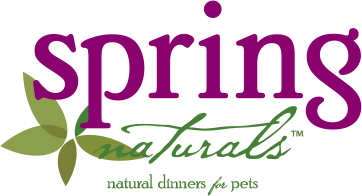
Dog Food Ingredients: The Total Breakdown
We are proud of the all-natural ingredients we have researched and selected to ensure our pet meals are of the highest quality on the market. That’s why we’re going above and beyond to list and describe each ingredient in our low glycemic dog food!
Dogs are facultative carnivores. This means most of their diet comes from meat, but they will consume other vegetable foods as well to supplement their diet. (Read our detailed article on this concept: If Dogs are Carnivores, Why Does Dog Food Contain Veggies?)
So, here’s the breakdown on all the ingredients that go into our dog foods to ensure they have the proper balance of vitamins and minerals.
A Breakdown of All the Ingredients in Spring Naturals Low Glycemic Dog Food
Tomato pomace is made by crushing tomatoes and combining the skin and seeds into a paste. Tomato pomace provides fiber and Lycopene for dogs, reducing the risk of heart disease. Vitamin A is also found in tomato pomace, which is critical for healthy eyes. Tomato pomace also includes vitamin C for the immune system and skin, beta carotene for brain health, folate and potassium for healthy muscles and circulatory system.
Apricots bring a tasty bonus to dog food, plus they are full of potassium and beta-carotene.
Sunflower oil is a great source of the omega-6 fatty acid essential for skin and hair growth, maintain the reproductive system, and promote a healthy immune system.
Pea starch is an alternative to traditional sugary or grain-based carbohydrates. Pea starch gives your dog the light carbohydrates they need for energy while giving them a boost of iron.
Dried eggs are a high quality protein that are full of flavor for dogs, easily digestible, and provide antioxidants and nutrients.
Sun cured alfalfa is flavorful and rich in protein, calcium, potassium, magnesium, vitamins C, B12 and D.
Flaxseed contains Omega 3 and Omega 6 fatty acids. These fatty acids help keep your dog's coat shiny and skin healthy. Flaxseed also contains alpha-linolenic acid, which is known for supporting the immune system.
Vitamin A supplement: Vitamin A gives dogs healthy skin and coat, a strong immune system, and supports eye health and function.
D3 supplement: Unlike humans, dogs cannot get their vitamin D3 from basking in the sun. Their heavy coat and thick oils of the skin make this impossible, so they must ingest any vitamin D3 they need. Vitamin D helps dogs retain calcium and phosphorus for keeping bones strong and healthy, and also maintains healthy blood pressure.

L-carnitine is an amino acid used by the body for energy metabolism.
Beta-carotene is a nutrient found in vegetables like carrots (and gives it the orangey color!) that is converted into vitamin A. Vitamin A gives dogs healthy skin and coat, a strong immune system, and supports eye health and function.
Choline chloride is one source of the B vitamin choline which occurs naturally in animal and plant material eaten by dogs. Choline chloride supports the function of nerves, liver, and metabolism.
Calcium pantothenate is a salt based in calcium, and it comes from vitamin B5 found in plants and animal tissues consumed by dogs. Vitamin B5 is a critical nutrient for growth and metabolism of carbohydrates, proteins, and fatty acids. It also helps to create cholesterol, lipids, neurotransmitters, hormones and hemoglobin.
Chicken fat preserved with mixed tocopherols: Tocopherols are a natural form of preservative to ensure your dog food has a decent shelf life. Kibble needs to last long enough to get from the producer to the pet store, and then it needs to stay fresh until you’ve purchased it and dished it out to your dog over a few weeks. So, premium pet foods nowadays prefer mixed tocopherols to do the job, in contrast to more chemical-based preservatives of the past. Tocopherols don’t last quite as long as the less natural preservatives, so be sure to keep an eye on expiration dates whenever you shop premium pet foods! Tocopherols are a source of Vitamin E and Vitamin A as well.
Potassium chloride: Potassium chloride is a form of colorless salt to boost the flavor of your dog’s food. Typical table salt is known chemically as sodium chloride, but by using a salt derived from potassium, we are able to add essential vitamins for the heart and nerve function. Studies have shown better potassium absorption in animals eating potassium chloride versus sodium chloride.
Dicalcium phosphate Tricalcium phosphate – A mineral that occurs in nature and is an essential nutrient to build bones and eliminate waste. Tricalcium phosphate is used as a vitamin supplement for both calcium and phosphorous. Phosphates maintain pH equilibrium in your pet’s diet, and it also helps in the food production process to keep food from sticking together.
Calcium carbonate is the same ingredient in antacid tablets like TUMS®. It provides additional calcium supplements to pets to help maintain strong bones. Dogs would naturally ingest calcium carbonate when they eat shellfish, eggshells, and bones of prey. As a bonus, calcium carbonate helps preserve the shelf life of pet food, as well as maintaining the color.
Iron proteinate is a mineral that keeps the circulatory system functioning properly. Without enough iron, blood would not properly carry oxygen throughout the body, and your pet would become anemic.
Zinc proteinate is an essential mineral that helps for the brain, pancreas, and adrenal glands. Dogs would naturally absorb zinc from the meat of prey – seafood, chicken and pork.
Manganese proteinate helps to form and maintain connective tissue – tendons, ligaments, etc.
Copper proteinate is an essential mineral that helps form red blood cells and connective tissue, such as tendons and ligaments and cartilage. Copper also helps with production of certain enzymes that maintain a healthy respiratory system.
Sodium selenite is an essential mineral salt which builds healthy tissues in the body and activates antioxidants.
Calcium iodate: provides iodine, a mineral utilized by the body for thyroid function. The thyroid is involved in metabolism and hormone production.
Thiamine mononitrate: Thiamine is Vitamin B1, a vitamin that plays an important role in metabolism, growth, nerve impulses, and the production of acetylcholine.
Niacin supplement: Niacin is Vitamin D3, a vitamin that aids in the production of fatty acids, amino acids, and glucose.
Vitamin E supplement: Vitamin E is a vitamin responsible for developing muscles and boosting the circulatory and immune systems.
Calcium pantothenate: Provides vitamin B5, which is essential in growth and development, maintaining the nervous system, and converting carbs to energy.
Pyridoxine hydrochloride: Pyridoxine hydrochloride is a common form of the B-vitamin pyridoxine, which is critical for metabolizing protein.
Riboflavin supplement: Riboflavin is used as a B-complex vitamin supplement, which aids in healthy growth and assimilation of amino acids and carbs.
Biotin is a B vitamin that helps metabolize fat and protein.
Vitamin B12 supplement: Vitamin B12 plays a heavy role in dogs’ health and function. The immune system, nervous system, digestive system and brain function all rely on Vitamin B12.
Folic acid is a vitamin that aids in cell production, specifically red blood cells.

If dogs are carnivores, where are there sometimes fruits, vegetables and starches added to some dog foods?
Dogs are actually facultative carnivores. This means most of their diet comes from meat, but they will consume other vegetal foods as well to supplement their diet. (Read our detailed article on this concept: If Dogs are Carnivores, Why Does Dog Food Contain Veggies?)
We boost the nutrition of our food with 6 superfoods that bolster your dog’s diet full of low carb, wheat-free, whole foods. We punch it up with added vitamins and minerals for functionally balanced, wholesome nutrition.
Chickpeas are a great protein source for dogs to provide balance between meat and non-meat proteins. They provide many vitamins and minerals not found in meat, while remaining low in fat.
Sweet potatoes are a superfood: high in fiber, sweet potatoes are a great source of antioxidants, iron, Vitamins A, C & B. They keep your pets coat shiny and healthy and support a strong immune system, healthy digestion and proper healing.
Blueberries Blueberries are packed with fiber, which aid in your pet’s digestion & helps control blood sugar levels.
Cranberries Cranberries have long been used to help pets and human experiencing Kidney issues and urinary tract infections.
Spinach Known for its iron content, spinach is a fiber-rich superfood. Its high-levels of Vitamin K contributes to proper bone health. The flavanoids & carotenoids found in spinach contain anti-inflammatory and cancer preventing properties to help sustain your pet’s health.
Quinoa In Addition to being an excellent energy source, this superfood has been associated with the prevention of cancer, diabetes and heart disease.
Carrots Loaded with phytonutrients and Vitamins A, K & C, they promote eye, heart and lungs health. Carrots are also known to improve your dog’s Vision and Blood sugar levels.
Parsley, spinach, alfalfa leaves, and dandelion greens provide extra Vitamin K and help with urinary tract health in dogs.
Rosemary extract simply acts as a natural preservative to make sure your dog food stays fresh from production to pantry. It also helps maintain the natural color of the food, preventing oxidation and discoloration.
Chicory Root extract is used as a supplement to support digestive health and the absorption of calcium for strong bones. It also benefits the natural bacteria that are part of a dog’s gut biome.

Post a Comment!